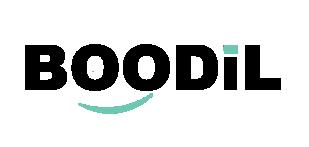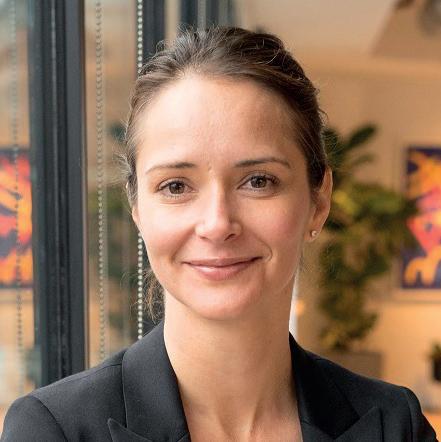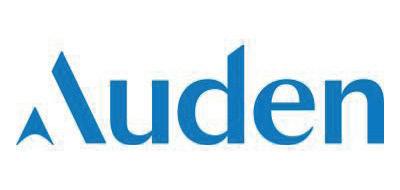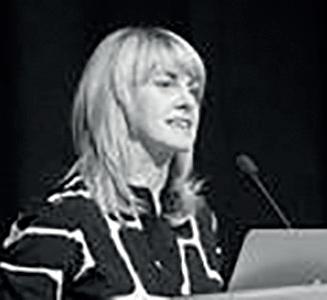Future of Fintech
www.businessandindustry.co.uk



Q4 2022 | A promotional supplement distributed on behalf of Mediaplanet, which takes sole responsibility for its content
“The power of fintech: guiding consumers through the cost of living crisis.”
Janine Hirt, Innovate Finance
Page 02
“Maximising the potential of fintech to do more good for others.”
ONLINE
Susanne Chishti and Glenn P Burgess FINTECH Circle
Since
the 2008 financial crisis,
WRITTEN BY Janine Hirt CEO, Innovate Finance

Over the past decade, financial services have been transformed as fintech companies — new entrants with technology at their core — have driven a new generation of more transparent, open and inclusive offerings. These innovative fintech companies have matured and become integral players in the UK financial ecosystem, with USD 9.1 billion of investment in 2022 alone.

Today, 80% of UK adults use fintech tools regularly, such as scanning their phones to pay for a bus journey.
Easier everyday management
This year, 2 million households will have missed a bill payment in the struggle to keep pace with the soaring prices, according to the consumer group ‘Which?’. Providing consumers with tangible solutions to help them in their everyday lives is at the core of many fintech companies’ propositions. Fintech enables people
to better understand, grow and manage their money — often in an easier, cheaper and more transparent way.
Fintech can help consumers gain a deeper understanding of their income and spending; prepare for possible economic scenarios such as price increases, energy costs and interest rates fluctuation; and facilitate the process of accessing finance.
have recently launched the ‘FinTech Pledge 2025’ campaign to improve the financial lives of 10 million people by 2025. Other examples include the likes of Minna Technologies, which helps consumers monitor their subscription spending; Snoop, which offers a free budgeting app; and TotallyMoney, which allows people to better understand and improve their credit scores.
Today, 80%
of UK adults use fintech tools regularly, such as scanning their phones to pay for a bus journey.
Making life easier: current and future solutions
Examples of fintech companies supporting the end consumer are many, varied and growing. Innovate Finance members Zopa and Clearpay
We can also expect to see new solutions — such as digital financial passports — enter the mainstream in the near future. These technologies will all play a core role in reducing financial exclusion and making payments more secure.
02 MEDIAPLANET A PROMOTIONAL SUPPLEMENT DISTRIBUTED ON BEHALF OF MEDIAPLANET, WHICH TAKES SOLE RESPONSIBILITY FOR ITS CONTENTS READ MORE AT BUSINESSANDINDUSTRY.CO.UK
our financial
have been
As we face a cost of living crisis that’s set to be the worst we have seen since records began, it’s more important than ever that we embrace the power of fintech to create a more democratic, inclusive and accessible financial services system that works better for everyone. @BusinessandindustryUK Contact information: uk.info@mediaplanet.com or +44 (0) 203 642 0737 @MediaplanetUK Please recycle Project Manager: Emma Shahbazi emma.shahbazi@mediaplanet.com Business Development Manager: Ciara Barker Managing Director: Alex Williams Head of Business Development: Ellie McGregor | Head of Print & Design: Thomas Kent Designer: Aimee Rayment Content Editor: Angelica Hackett O’Toole | Head of Digital Operations: Harvey O’Donnell Paid Media Strategist: Jonni Asfaha Social & Web Editor: Henry Phillips Digital Assistant: Carolina Galbraith Duarte | All images supplied by Gettyimages, unless otherwise specified
systems
disrupted and transformed by fintech.
The power of fintech: guiding consumers through the cost of living crisis

A PROMOTIONAL SUPPLEMENT DISTRIBUTED ON BEHALF OF MEDIAPLANET, WHICH TAKES SOLE RESPONSIBILITY FOR ITS CONTENTS READ MORE AT BUSINESSANDINDUSTRY.CO.UK 03 MEDIAPLANET
use of non-sweeping VRPs by subscription services will also allow customers more control and confidence around repeat expenditure.
The
~Henk
Van Hulle, CEO, Open Banking Implementation Entity
WRITTEN BY Henk Van Hulle CEO, Open Banking Implementation Entity
How Variable Recurring Payments deliver value to consumers and businesses
The introduction of Variable Recurring Payments (VRPs), a pioneering payment instruction hailed as a ‘smart direct debit,’ allows authorised providers to initiate a series of payments for customers at variable intervals and for varying amounts.
VRPs are secure, seamless payments and operate within customer-defined parameters. They offer consumers and businesses greater control and transparency than direct debit and card-on-file instructions. Here at the Open Banking Implementation Entity, delivering the standard for VRPs is the final milestone in our roadmap as mandated by the Competition and Markets Authority, and we’ve been pleased to see ‘sweeping’ through the technology of VRPs already delivering tangible benefits.
Supporting borrowers
With the cost of living rising, sweeping can improve financial resilience in several ways.
For example, sweeping can support borrowers by enabling surplus funds to be automatically transferred from a current account to a credit card, overdraft or loan account to shrink larger debt faster. This can help customers repay a debt before incurring repayment fees and to keep borrowing costs to a minimum.
Sweeping to earn interest
With interest rates rising, moving cash to savings accounts that optimise returns would benefit those small businesses hugely.
Non-sweeping use cases
While our mandate is only to deliver the standard for VRPs to support sweeping, many eyes are now on VRPs for nonsweeping, paving the way for consumers to easily pay for services such as utility bills, subscriptions and charitable donations.
Estimates suggest that 15% of the UK’s small businesses have around £100,000 sitting in low-interest current accounts — a total of £130 billion.
VRPs can support effective saving by automatically moving surplus funds out of current accounts and into interestearning savings accounts. Estimates suggest that 15% of the UK’s small businesses have around £100,000 sitting in low-interest current accounts — a total of £130 billion.
One major UK retail bank recently launched VRPs for non-sweeping with third-party payment providers, partnering with the international food charity — Charity Right and lettings management platform Pink Chilli.
The use of non-sweeping VRPs by subscription services will also allow customers more control and confidence around repeat expenditure. They will be able to clearly see what they are committing to, and when, so that they can avoid falling into the dreaded ‘subscription trap.’
We are delighted to see VRPs — sweeping and non-sweeping — move into daily use, and we look forward to seeing other uses of this innovative payment method deliver benefits to consumers and businesses alike in 2023 and beyond.
Variable Recurring Payments
Interest in open banking is growing — and fintech providers are now offering open banking-powered Variable Recurring Payments (VRP), giving the direct debit of 50 years ago a makeover.
Open banking is continuing to forge new frontiers in the payments landscape, says Fliss Berridge, Co-founder of open banking payments fintech, Ordo.


Providers are now expanding their services to provide a Variable Recurring Payments (VRP) facility which will be a fast and low-cost way for businesses to collect regular payments from their customers.
Account-to-account payments are good for business
Increasingly, users of open banking account-to-account payment services are recognising that it can save them time and money. “If a customer pays using a card, for example, it takes days for the money to arrive with the supplier — and with a hefty card fee deducted,” says Fliss.
With open banking, money is transferred between accounts in realtime, in full; and with automatically correctly referenced payments, reconciliation is easy. It’s safer than cards and bank transfers and is easy to set up and use. For example, Ordo’s fully hosted and managed white-labelled
services are ‘plug and play’ — no tech build or screen journey design needed, just savings from day one.
How Variable Recurring Payments will transform banking VRPs are a fast and low-cost method of collecting regular payments that could provide an alternative to direct debits. Direct debit setup takes weeks, but VRP setup takes minutes, and money transfer is immediate.
“The first use case for VRP — sweeping — is live now and offers me-to-me payments” Fliss explains. “This means customers can ‘sweep’ money between their accounts. It requires a one-time setup, where you specify frequency and amounts, then, repeated payments are swept automatically between current and savings accounts or to repay a loan, for example. It’s secure, convenient and frictionless.”
The further evolution of VRP in 2023 will enable people to pay all their bills using VRP. Businesses will be able to use VRPs to instantly arrange and collect multiple payments, whilst still giving the consumer a degree
of control. Giving control to retain customers will be crucial for businesses in the coming months because, according to statistics from Ordo — over 50% of people who cancelled direct debits by way of belt-tightening during the pandemic say they won’t be reinstating them.
Come next year, services from the likes of Netflix, energy companies and local councils will be billing customers using instant VRP — and organisations will reflect and wonder: ‘what were we doing hanging around for three days waiting for direct debits to clear?’
Managed white labelled Paymentsas-a-Service: providing businesses with low cost, simple and secure Open Banking solutions transferring money instantly. Fully hosted payments, by experts doing the heavy lifting tech for businesses. Find out more
ordopay.com
04 MEDIAPLANET A PROMOTIONAL SUPPLEMENT DISTRIBUTED ON BEHALF OF MEDIAPLANET, WHICH TAKES SOLE RESPONSIBILITY FOR ITS CONTENTS READ MORE AT BUSINESSANDINDUSTRY.CO.UK
Paid for by Ordo
at
What are
and why do businesses need to know about it?
INTERVIEW WITH
Fliss Berridge Co-Founder, Ordo
WRITTEN BY Tony Greenway
Building financial resilience and improving experiences for customers
Building a more holistic view of customers’ finances through machine learning (ML) algorithms may bring financial services to more consumers and extend the customer base for financial institutions.
Holistic view
Data creates a more accurate financial picture of an individual, which banking institutions can draw upon to make better-informed lending decisions, according to industry expert Ed Maslaveckas.
“Traditionally, the bank data we have is not used in these affordability assessments, but it is also a technical challenge to do it well,” he says. However, with rising inflation and interest rates creating a tougher environment for households, he believes it is now more important than ever to provide a holistic overview of people’s finances.
Data intelligence
Maslaveckas is co-founder and CEO of financial data intelligence firm Bud, which launched in 2015 as a consumer-facing app focused on transaction data to give people a better insight into their finances.
More recently, the approach has pivoted to help banks and fintech better support their customers. “It is a twofold approach: to give customers a real-time picture of their finances and make better decisions while enabling businesses to make clearer assessments of the affordability of their customers,” he says.
Rewarding consumers via open banking payments
Consumer incentives and benefits may be more common in open banking payments to encourage more people to use it as a payment method.
Open banking payments have grown slowly as a payment method in the UK since first introduced in 2017. Recent data suggests that less than 10% of consumers are using it, however, industry figures believe this will rise as new factors come into play.
Open banking
Open banking payments entrepreneur Harry Luscombe suggests that PSD2 (Payment Services Directive Two) legislation has created friction with the requirement for consumers to authenticate their payment manually in their banking app.
“PSD2 is causing more friction around online payments, which has the potential to increase the adoption
Financial resilience
Building financial resilience and predicting future outcomes remains crucial. “If customers of banks and fintechs are not resilient, they are not going to be able to repay,” he adds.
Accurate information leads to customer resilience and longer-term financial planning while giving the financial sector a clearer picture of their customers’ finances and, in turn, helping avoid default on loans or mortgages. As most people have transactions in different places and formats, using ML to stitch the technology together delivers richer financial understanding, he adds.
Integrated technology
Today, banks and fintech use Bud technology for clearer insights to make more realistic lending decisions and build financial resilience on both sides.
“Globally, this is where the market is moving because there are efficiencies to be gained,” says Maslaveckas. Traditionally, banks have been limited in the experience they can provide customers due to complex processes and fragmented systems; but with more data, lenders can use Bud products to verify income and speed up identity confirmation to improve experiences and create a more tailored lending process, he concludes.
of open banking payments,” he adds. “It’s still not at the rate it was projected, however, it’s set to grow significantly over the coming years, and PSD2 could be highly influential in persuading customers to trial this payment method.” Currently, open banking payments still primarily benefit businesses over consumers — this creates another, huge opportunity within the sector.
Consumer incentives
Merchants enjoy low transaction fees, instant settlement of funds and reduced fraud risk. Several operators in the field still focus on this, but Luscombe believes that if the concept is to evolve, consumers must also be incentivised to use this method.
As CEO and co-founder of Boodil — an open banking payment method that rewards customers every time they spend — he explains: “Our new consumer engagement application ‘reverse engineers’ what the majority of the open banking market is doing. Every time someone checks out with our payment solution, we give them redeemable points to use for rewards or to enter our various prize draws for anything from vouchers and electronic goods to holidays abroad.”

Quick and secure Fellow co-founder Sam Owens handles Boodil’s day-to-day operations with merchants, banks and other integration partners ranging from the automotive, e-commerce and booking application sectors.


He elaborates that it appeals to a younger audience who are more open to new technologies, solutions and payment methods. Owens says the payment solution works with the customer’s mobile banking app which confirms and authorises the payment; and while there are oneclick checkouts on the market, he emphasises how Boodil is extremely quick and secure.
“Individuals have to authenticate payment by biometrics — either face or finger ID — so it’s more secure than traditional card payment,” he adds. The rewards element will encourage consumers to transition to open banking payments.

A PROMOTIONAL SUPPLEMENT DISTRIBUTED ON BEHALF OF MEDIAPLANET, WHICH TAKES SOLE RESPONSIBILITY FOR ITS CONTENTS READ MORE AT BUSINESSANDINDUSTRY.CO.UK 05 MEDIAPLANET
INTERVIEW WITH Harry Luscombe Co-Founder, Boodil
Paid for by Boodil Find out more at boodil.com Scan the QR
to find out more Paid for by Bud
INTERVIEW WITH Sam Owens Co-Founder, Boodil
code
Technology can prove critical in helping create a wider lending pool for banks and fintech.
INTERVIEW WITH Edward Maslaveckas CEO, Bud
WRITTEN BY Mark Nicholls
WRITTEN BY Mark Nicholls
Synthetic data will be a game-changer for innovation
The ability to change real data into AI-generated synthetic data will be advantageous for any organisation dealing with privacy-sensitive information.
Synthetic data looks set to transform the way organisations handle privacy-sensitive datasets, enabling them to fully utilise statistical information in a fraction of the time — allowing innovation to flourish quickly.
A data revolution
For sectors dealing with sensitive data that includes Personal Identifiable Information (PII) — particularly the banking and insurance industries — synthetic data will be a game-changer.
Dr Tobias Hann, Chief Executive Officer for MOSTLY AI, says: “Synthetic data is a new, developing category within technology. We think it can change how companies work with data.” He explains that synthetic data is made-up data. The process uses machine learning algorithms that are trained on the original data, so synthetic data represents real data in that all the statistical properties are retained — but without any of the PII.
“Essentially, it’s anonymous data that can be used more easily for sharing both internally and externally, as it’s GDPR-compliant,” says Hann.
Synthetic data benefits
It enables businesses to work with data in ways that weren’t possible before, such as sharing datasets with far more employees, external research partners and vendors. Another major benefit is that time-to-data is significantly reduced. In the past, it could take up to six months to access data due to internal compliance processes — that is now reduced to minutes.
Hann says: “Traditional ways of anonymising data involve manual processes which take time and human resources. Here, we have a simple solution that allows for speedy data anonymisation with little human intervention.”
Shaping the future
MOSTLY AI, established five years ago, is a software vendor that created a pioneering software platform allowing organisations to generate synthetic data based on their existing datasets, at the touch of a button. Launching next year will be the added capability of programmable data which will allow users to change the data, for example, by modifying it to correct biased and unfair information.
Hann concludes: “In the past, we’d say synthetic data is as good as real data. But now, we say it’s better because it can be shaped and formed to become more relevant for our clients.”


Exploring how our financial systems could support a
retail CBDC
The Bank of England and HM Treasury have been contemplating the introduction of a Central Bank Digital Currency (CBDC) and whether it would be beneficial to our economy.
While no decision on a CBDC has been made at this stage — if they decide to go ahead, it could significantly impact our financial systems and the way people and businesses make payments.
Challenges and solutions
The private sector may have a role in introducing a CBDC; but what are the hurdles, and how could they be overcome?
The two key considerations are (1) Fungibility — the ability for a CBDC to be exchanged with bank notes, coins and other types of money; and (2) Interoperability — the ability of the system to exchange one form of money for another.
Finding a solution to these issues is not as simple as it sounds. The payments ecosystem will need to be adapted to make this change — a task that is not insignificant. By comparison, the 2020 estimated cost of implementing changes to enable Open Banking was £1.5 billion.
Potential models
Currently, both Financial Market Infrastructures (or FMIs, often referred to as the ‘plumbing’ of the financial system) and payment service providers (PSPs: companies that provide services to businesses to help them get paid) have services and systems
that support interoperability of the market. UK Finance has explored models to allow a CBDC to be worked into these. One model relies on FMIs, one relies on Payment Interface Providers and a third relies on a hybrid of both.
Each model has its own benefits, but any infrastructure change must enable firms to provide consumer services at a competitive price point. Moreover, to fully understand the best model, we need better clarification of the policy objectives of launching a CBDC. The industry also needs to understand whether firms will be required by regulation to provide CBDC services or whether it will be left to the competitive market.
Studying the benefits
The CBDC development process allows public and private bodies to work together to understand the technical concerns and opportunities at hand. A UK CBDC could change the way people and businesses use financial services while welcoming innovation. While UK Finance has started to think about how this could be done in practice, changes to the payments system must be thoroughly investigated to ensure that a CBDC will benefit the UK economy.
06 MEDIAPLANET A PROMOTIONAL SUPPLEMENT DISTRIBUTED ON BEHALF OF MEDIAPLANET, WHICH TAKES SOLE RESPONSIBILITY FOR ITS CONTENTS READ MORE AT BUSINESSANDINDUSTRY.CO.UK
WRITTEN BY Jana Mackintosh Managing Director of Payments and Innovation, UK Finance
By comparison, the 2020 estimated cost of implementing changes to enable Open Banking was £1.5 billion.
Paid for by MOSTLY AI Find out more at mostly.ai/game-changer
INTERVIEW WITH Dr Tobias Hann CEO, MOSTLY AI
WRITTEN BY Sheree Hanna
How responsible fintech can offer support to many people
Fintech solutions can play a valuable role in offering a lifeline to the growing number of people facing financial challenges.
As the current cost of living crisis deepens, more people are in financial difficulty and falling outside the primetime lending market, but financial literacy advocate Victoria Gosling believes smart technology can help support people by creating more choice, which can help them achieve better longterm financial stability.


Financial literacy

Fintech can deliver a better understanding of people’s individual circumstances, therefore leading to better decision-making in terms of offering appropriate products and services.
Gosling describes how this understanding can benefit people through the provision of ‘handrails’
that guide them in the right direction through clearer financial information that empowers more informed choices.
Gosling is the Chief Impact Officer of Auden, which has a mission to contribute to greater financial inclusion by supporting people who are often outside of the mainstream financial system. She is also a board member of Responsible Finance, which aims to create a fairer financial system in the UK. She says improving financial literacy puts choice back into the hands of individuals and adds: “I believe that the greater the choice, the better the potential outcome.”
Mental health Gosling underlines the importance of developing responsible fintech solutions in the current crisis as many
people are particularly vulnerable at present. In addition, the link between mental and financial health has more recently become apparent.
“What I’ve found is that when somebody has good mental health, their ability to deal with their finances is much greater,” she says. Individuals and families, as well as younger people, need signposting through a “cluttered and scary financial landscape.”
Financial inclusion
By delivering better financial literacy and supporting greater choice, fintech can prepare the grounds for increasing financial inclusion. A more informed and supported individual needs greater choice, Gosling advocates. “Improving choice for those individuals who fall out of mainstream finance is really important.”
Tech has a role to play in creating the choice. Auden has launched a financial app called Auden Money, which helps people with budgeting and understanding the benefits they may qualify for. The goal is to help people access and understand their financial information — another factor in building inclusivity.

Urging the financial sector to work collectively to deliver greater financial inclusion, Gosling says fintech can be a force for good. “Fintech has a huge opportunity to help people both in the current cost of living crisis and to rebuild for the future.”
Maximising the potential of fintech to do good for society
The current cost of living crisis has sweeping effects on the day-to-day lives of UK consumers. This will impact financial firms — from how much money customers will have at any point to how SMEs will react to potential cash flow issues.
Cost of living Crisis
The priority is to create a financial system that caters to all. Financial inclusion is not a buzzword — but it starts at home, where 4 million people in the UK have no bank account.
The cost of living crisis has drawn into focus the need to better equip the increasing numbers of vulnerable people across the UK. With more households running deficit budgets, we can expect a huge increase in late payments, mortgage defaults and bad debts that will drastically change the personal finances of millions for years to come.
The pension time bomb
This year, the UK Government published research that compared state pension systems globally. It showed that the UK is providing less pension than most other advanced economies. Across OECD countries, governments normally contribute almost 80% to people’s pensions when citizens retire — while in the UK, it’s only 50%. So, 50% of pension income in the UK should come from company pensions
and private pension schemes, but many people don’t have enough money saved in their company pension and cannot afford to personally save for their old age.
That’s why the fintech sector must provide people with solutions to help with savings and investments that are easy to set up and maintain from a young age until retirement. Financial services’ contributions to society’s safety net in this high inflationary environment can make ‘fintech for good’ a reality.
Low-cost transactions via Decentralized Finance
Consumers and small to medium-sized businesses have a collective impact as well. Technology like decentralised finance (DeFi) is a huge opportunity for financial services to make transactions more transparent. By cutting out middlemen, many payments will be completed at fewer costs through a decentralised, open-source network. Decentralised lending and crossborder payments are the beginning which will allow global payments at almost zero costs settled in real-time, every day of the year.
DeFi can also democratise access to finance in emerging markets, helping with financial inclusion. Eventually, it will create a digital exchange ecosystem where money and value are transferred on blockchains using smart contracts just as information and data are transferred today.
A PROMOTIONAL SUPPLEMENT DISTRIBUTED ON BEHALF OF MEDIAPLANET, WHICH TAKES SOLE RESPONSIBILITY FOR ITS CONTENTS READ MORE AT BUSINESSANDINDUSTRY.CO.UK 07 MEDIAPLANET
INTERVIEW WITH
Vicky Gosling OBE Chief Impact Officer, Auden
Paid for by Auden Find out more at auden.com
WRITTEN BY Mark Nicholls
The financial and fintech sectors have a huge responsibility towards society — having to move from ‘doing no harm’ to ‘doing good.’
WRITTEN BY Glenn P Burgess CMO, FINTECH Circle
FINTECH Circle is launching the ‘Fintech for Good’ film with ITN Business. It explores the power of fintech and explains how businesses can embrace cutting-edge fintech solutions to make a real difference in people’s lives.
By cutting out middlemen, many payments will be completed at fewer costs through a decentralised, open-source network .
WRITTEN BY Susanne Chishti CEO & Founder, FINTECH Circle





















08 MEDIAPLANET A PROMOTIONAL SUPPLEMENT DISTRIBUTED ON BEHALF OF MEDIAPLANET, WHICH TAKES SOLE RESPONSIBILITY FOR ITS CONTENTS READ MORE AT BUSINESSANDINDUSTRY.CO.UK Subscription Economy: a Transformed World In partnership with Subscription Economy: a Transformed World Discover what’s driving the subscription economy in a post-pandemic world Data, trends and insights from: 1,000+ UK consumers 1,000+ US consumers 50 subscription businesses 20+ thought leaders In partnership with View the report –scan the QR code or visit minnatechnologies.com/ subscription-economy







































